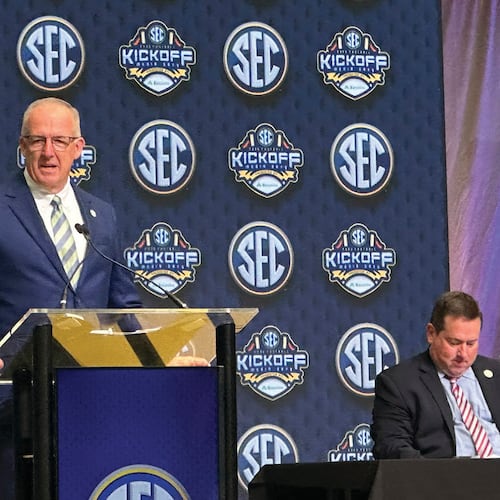Well, it seemed like a good idea when Gary Stokan came up with it — three Chick-fil-A Kickoff games at Mercedes-Benz Stadium in an eight-day period.
But amid the coronavirus pandemic, the ambitious scheduling — Florida State vs. West Virginia on Sept. 5, Georgia vs. Virginia on Sept. 7 and Auburn vs. North Carolina on Sept. 12 — presents all sorts of complications and uncertainties for the event operators.
“We thought putting on three games was going to be enough of a challenge,” said Stokan, president and CEO of Peach Bowl Inc., which operates the Kickoff games. “But now you put this pandemic on top of it, and my staff, God bless them, are saying, ‘Thanks a lot, Gary.’”
Stokan maintains optimism that the games will be played, although that will be determined by the course of COVID-19. His staff is developing contingency plans for various safety protocols and reduced levels of seating capacity.
“I’m probably the most optimistic person you know, so we have not looked at the potential of not having these games,” Stokan said. “We’ve talked to ESPN, Mercedes-Benz Stadium, all the teams’ athletic departments and gone through different scenarios of what we may or may not do. … We’re waiting for TicketMaster software so that we can start to scale out and model seating capacity to different options – 25%, 30%, 50%, etc.
“We’re looking at all the contingencies.”
The Chick-fil-A Kickoff started in 2008 and has hosted at least one game every year since then, making it college football’s current longest-running season-opening neutral-site event. It has hosted two games in each of three years, but had never undertaken more than that in one year until lining up three games for 2020.
The Peach Bowl Inc. staff has been working from home since mid-March and tentatively plans to reopen its office Aug. 3, Stokan said. The organization has had no layoffs or furloughs, he said, and has adapted to conducting business largely by video conferencing.
“One day, I hit for the cycle — I was on a WebEx, a Skype, a Zoom and a Teams,” Stokan said with a laugh.
If the three Kickoff games are played, a wide range of financial and logistical issues will have to be worked out.
Provided fans are allowed in the stadium at all, social-distancing requirements will dictate the seating capacity, which Stokan said will be set in consultation with government and public health officials, stadium officials, the participating schools and their conferences.
“I would think when we get into the beginning of August, people will make calls on what it will look like as far as capacity,” he said.
With less-than-full stadiums, the payouts to the participating teams will have to be reduced, Stokan said.
The contracts with the six participating schools specify the payouts ($4.25 million to Georgia for playing in the Labor Day game against Virginia, for example) and how many tickets each team commits to sell or purchase (30,000 for a total price of $4.575 million in Georgia’s case). Reduced capacity would obviously reduce the potential ticket sales and, in turn, the money available for payouts. TV revenue goes to the conferences of the participating teams.
“Because we don’t get any of the TV money for the Kickoff games, it’s really a scenario where you have to depend on tickets as your main source of revenue and then secondarily the sponsorships,” Stokan said. “Both are going to be down.
“Because you’re not going to be able to have activations for the sponsors, you’ve got to look at different ways to meet their demands, and in some cases you may not be able to meet them. And tickets – if it’s 25% or 30% or 50% capacity, there’s going to be less revenue for payouts.”
Mercedes-Benz Stadium officials haven’t said how many fans could attend games with social distancing. But the operator of New Orleans’ Superdome, a similar size venue, has said that under a six-foot social-distancing guideline that stadium could have 17.5% of its normal capacity – or about 13,000 fans.
“Once we know the capacities of people allowed to attend games, we’ll say to the athletic directors, ‘How many tickets would you like, based on that?’” Stokan said. “Obviously, if you’re only going to buy a certain amount of tickets and our revenues are down, we’re going to have to negotiate a new payout. We haven’t begun those negotiations because we just don’t know what the numbers will be.”
If the college football season were to open without any fans in attendance, it isn’t clear how the Kickoff’s business model could work.
Another complicated issue that Stokan’s staff is grappling with: the safety protocols. Among the possible changes mentioned by Stokan: Rows of seats closest to the field may be covered with tarps to keep distance between the teams and the fans; ceremonial “team walks” into the stadium likely will be eliminated; the “Old Leather Helmet” trophy, typically given to Kickoff winners on the field after the games, may be presented at a Zoom news conference instead.
Stokan said his staff has a meeting scheduled July 23 with Mercedes-Benz Stadium officials to discuss safety protocols.
“We are in an era of unknowns and surreal times,” Stokan said. “It gets a little frustrating for everybody, but patience and discipline, I think, are the keys here. If we can all adhere to that, then I think we can have a successful first week of college football in Atlanta.”
Whatever happens, this may well be the last -- and only -- year the Kickoff event endeavors to hold three games. That largely is because of the difficulty of lining up neutral-site games as high-profile programs increasingly schedule home-and-home non-conference series.
The Chick-fil-A Kickoff has two games scheduled for both 2021 and 2022 and one for 2024. It expects to have commitments within perhaps a month or so for single games in 2023 and 2025.
About the Author
Keep Reading
The Latest
Featured



